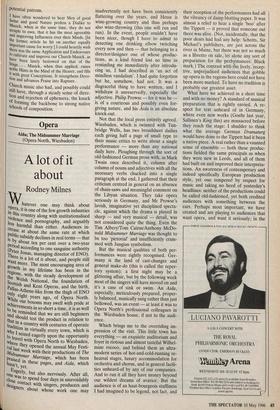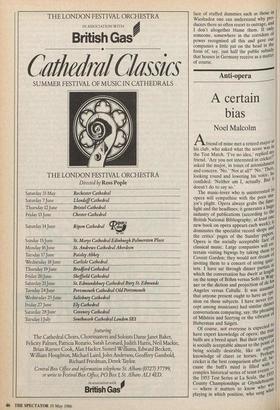Opera Aida; The Midsummer Marriage (Opera North, Wiesbaden)
A lot of it about
Rodney Mdnes
hatever one may think about 0. pera, it is one of the few growth industries In this country along with institutionalised violence and pornography, and arguably less harmful than either. Audiences in- crease at about the same rate at which public subsidy declines in real terms — that is by about ten per cent over a two-year Period according to one sanguine authority (Peter Jonas, managing director of ENO). There is a lot of it about, and people still want more. The most encouraging area of growth in my lifetime has been in the regions, with the steady development of the Welsh National, the foundation of Scottish and Kent Operas, and the birth, Pallas-Athene-like from the thigh of ENO Only eight years ago, of Opera North. While our bosoms may swell with pride at achievements in so short a time, it is as well to be reminded that we are still beginners and should test the product in relation to that in a country with centuries of operatic tradition in virtually every town, which is Why I seized eagerly upon the opportunity to travel with Opera North to Wiesbaden, Where they opened the annual May Festi- vAl. last week with their productions of The 42161s urnmer Marriage, which has been Praised in these pages, and Aida, which hasn't, yet. _ Eagerly, but also nervously. Alter all, uitte was to spend four days in unavoidably C2oSe contact with singers, producers and "lesIgners about whose work one may inadvertently not have been consistently flattering over the years, and Hesse is wine-growing country and thus perhaps also wine-throwing (this one will run and run). In the event, people couldn't have been nicer, though I have to admit to detecting one drinking elbow twitching every now and then — that belonging to a director/designer one of whose produc- tions, as a kind friend lost no time in reminding me immediately after introdu- cing us, I had described as `an act of mindless vandalism'. I had quite forgotten but he, somehow, had not. It was a disgraceful thing to have written, and I withdraw it unreservedly, especially the adjective. Philip Prowse — for it was he — is of a courteous and possibly even for- giving nature, and his Aida is an absolute knock-out.
Not that the local press entirely agreed. Wiesbaden, which is twinned with Tun- bridge Wells, has two broadsheet dailies each giving half a page of small type to their music critics to write about a single performance — more than any national daily here. Ploughing through the sort of old-fashioned German prose with, as Mark Twain once described it, column after column of nouns and adjectives with all the necessary verbs chucked into a single paragraph at the end, I gathered that their criticism centred in general on an absence of chain-saws and meaningful comment on the Libyan situation. They take opera seriously in Germany, and Mr Prowse's lavish, imaginative yet disciplined specta- cle, against which the drama is played in sharp — and very musical — detail, was not considered quite the thing. Even the Tim Albery/Tom Cairns/Anthony McDo- nald Midsummer Marriage was thought to be too 'pictorial' and insufficiently cram- med with Jungian symbolism.
But the musical qualities of both per- formances were rightly recognised. Ger- many is the land of cast-changes and general make-do (this is called the reper- tory system): a first night may be a glittering affair, but by the following week most of the singers will have moved on and it's a case of sink or swim. An Aida, especially, meticulously prepared, proper- ly balanced, musically sung rather than just bellowed, was an event — at least it was to Opera North's professional colleagues in the Wiesbaden house, if not to the audi- ence.
Which brings me to the overriding im- pression of the visit. This little town has everything — an exquisite auditorium and foyer in riotous and almost tasteful Wilhel- mine rococo, and behind them an ultra- modern series of hot-and-cold-running re- hearsal stages, luxury accommodation for orchestra and chorus, and in general facili- ties unheard-of by any of our companies. And to run it all they have money beyond our wildest dreams of avarice. But the audience is of an haut-bourgeois stuffiness I had imagined to be legend, not fact, and their reception of the performances had all the vibrancy of damp blotting paper. It was almost a relief to hear a single `boo' after the Tippett — it proved that someone out there was alive. (Not, incidentally, that the poor dears had had any help: Schotts, Sir Michael's publishers, are just across the river in Mainz, but there was not so much as a libretto on sale, let alone any sort of preparation for the performances. Black mark.) The contrast with the lively, 'recep- tive, unprejudiced audiences that gobble up opera in the regions here could not have been more marked. To have no tradition is probably our greatest asset.
What have we achieved in a short time and with no money? A standard of musical preparation that is rightly envied. A re- spect for text unheard of in Germany, where even new works (Goehr last year, Sallinen's King this) are massacred before they reach the stage: I shudder to think what the average German Dramaturg would have done to the Tippett had it been a native piece. A real rather than a vaunted sense of ensemble — both these produc- tions fielded the same principals as when they were new in Leeds, and all of them had built on and improved their interpreta- tions. An awareness of contemporary and indeed specifically European production style, yet one tempered by respect for music and taking no heed of yesterday's headlines: neither of the productions could be called old-fashioned, yet both credited audiences with something between the ears. Perhaps most important, we have created and are playing to audiences that want opera, and want it seriously; in the face of stuffed dummies such as those in Wiesbaden one can understand why pro- ducers there so often resort to outrage, and I don't altogether blame them. If only someone, somewhere in the corridors of power recognised all this and gave our companies a little pat on the head in the form of, say, just half the public subsidy that houses in Germany receive as a matter of course.



























































 Previous page
Previous page